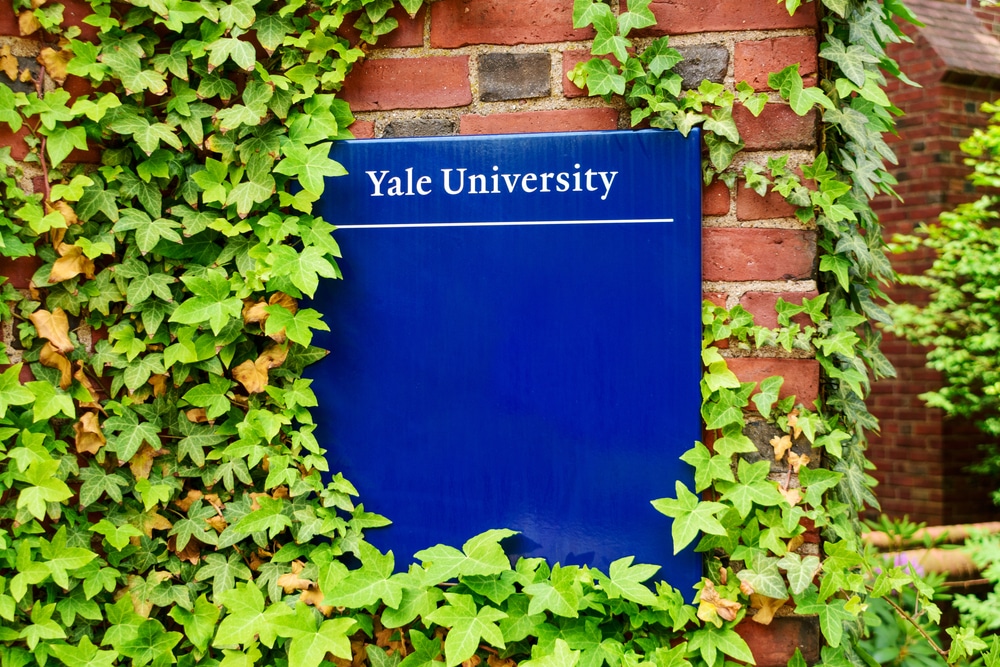We’ll take you on a journey by exploring the wonders of Yale’s astrophysics program, from its rich history to current projects. We’ll also introduce you to some of the brilliant minds behind this program, including faculty members, researchers, and alumni.
What Is The History of Yale’s Astrophysics Program?
Yale’s astrophysics program traces its roots back to the 19th century when the university established its first observatory. Throughout the years, Yale’s astrophysics program has been home to some of the most influential and groundbreaking research in the field, from the discovery of pulsars to the confirmation of the existence of dark matter.
Today, Yale continues to be at the forefront of astrophysics research, with a focus on cutting-edge technology and innovative approaches to solving some of the universe’s biggest mysteries.
One of the most notable achievements of Yale’s astrophysics program was the discovery of the first exoplanet orbiting a sun-like star in 1995. This discovery revolutionized the field of astronomy and opened up new avenues for research into the possibility of extraterrestrial life. Since then, Yale researchers have continued to make significant contributions to the study of exoplanets and their potential habitability.
In addition to its research efforts, Yale’s astrophysics program also places a strong emphasis on education and outreach. The program offers a variety of courses and opportunities for students to get involved in research projects and hosts public lectures and events to engage with the broader community.
Through these efforts, Yale’s astrophysics program is not only advancing our understanding of the universe but also inspiring the next generation of scientists and astronomers.
What Are Some Cutting-Edge Astrophysics Research and Innovations at Yale?
One of the hallmarks of Yale’s astrophysics program is its commitment to pushing the boundaries of what is possible through innovative research projects. From developing new instruments and telescopes to studying the composition of galaxies and the origins of black holes, Yale astrophysics faculty members and researchers are leading the way in exploring some of the most fascinating and complex phenomena in the universe.
One of the most exciting areas of research in Yale’s astrophysics program is the study of exoplanets. Yale researchers are using advanced techniques to detect and analyze planets outside of our solar system, with the goal of understanding their composition, atmosphere, and potential for supporting life. This research has the potential to revolutionize our understanding of the universe and our place within it.
In addition to groundbreaking research, Yale’s astrophysics program also offers unique opportunities for students to get involved in hands-on projects and gain valuable experience.
Undergraduate and graduate students have the chance to work alongside faculty members on research projects, participate in observing runs at world-class observatories, and attend conferences and workshops to present their findings and network with other researchers in the field.
What Is The Role of Yale Astrophysics in Advancing our Understanding of the Universe?
Yale’s astrophysics program also plays a critical role in advancing our overall understanding of the universe. By studying everything from the properties of individual stars to the evolution of entire galaxies, Yale researchers are unraveling some of the most fundamental questions about the origins and nature of the cosmos.
From the search for exoplanets that could support life to the study of gravitational waves and their implications for our understanding of space and time, Yale’s astrophysics program is making groundbreaking discoveries that will shape our understanding of the universe for years to come.
One of the most exciting areas of research in Yale’s astrophysics program is the study of dark matter and dark energy. These mysterious substances make up the vast majority of the universe, yet we know very little about them.
Yale researchers are using a variety of techniques, including observations of the cosmic microwave background radiation and the movements of galaxies, to try to understand the properties of dark matter and dark energy. This research could have profound implications for our understanding of the universe and the fundamental laws of physics.
Who Are Some Of The Faculty and Researchers Behind Yale’s Astrophysics Program?
Yale’s astrophysics program is home to some of the most respected and accomplished researchers in the field today. From Professor Meg Urry, the first female chair of the physics department, to Professor Priyamvada Natarajan, whose work on the nature of dark matter has earned her numerous accolades, the faculty members at Yale are shaping the future of astrophysics research.
In addition to faculty members, Yale’s program also attracts top researchers from around the world, who come to the university to collaborate and contribute to the exciting work being led by Yale astrophysics faculty members.
One of the unique aspects of Yale’s astrophysics program is its emphasis on interdisciplinary collaboration. Faculty members and researchers from different departments, such as astronomy, physics, and engineering, work together to tackle some of the biggest questions in astrophysics.
This approach has led to groundbreaking discoveries, such as the detection of gravitational waves, which was a collaborative effort between astrophysicists and engineers. By fostering a culture of collaboration and innovation, Yale’s astrophysics program is at the forefront of advancing our understanding of the universe.
What Are Some Of Yale’s Astrophysics Labs and Facilities?
Yale’s astrophysics program includes a range of cutting-edge laboratories and facilities that are designed to support innovative research projects.
From the Spitzer Infrared Telescope Facility to the SMARTS Telescope Consortium, these labs and facilities offer a glimpse into the groundbreaking work being done at Yale.
For students and researchers alike, these facilities serve as hubs for exploration and discovery, enabling them to gain hands-on experience with the latest telescopes, instruments, and technologies.
One of the most exciting labs at Yale’s astrophysics program is the Center for Research Computing, which provides researchers with access to high-performance computing resources.
This allows them to run complex simulations and analyze large data sets, which is essential for understanding the universe’s most mysterious phenomena. The center also offers training and support for researchers who are new to computing, making it an invaluable resource for students and faculty alike.
How Does Yale Astrophysics Student Life Look Like?
At Yale, students interested in astrophysics have a wealth of opportunities to get involved in this exciting field. From student-run clubs and organizations to research internships and summer programs, there are countless ways for students to immerse themselves in the world of astrophysics at Yale.
Whether it’s collaborating with faculty members on cutting-edge research projects or attending talks and presentations by renowned experts in the field, Yale provides a rich and diverse community of students and scholars who share a passion for exploring the universe.
One of the most popular clubs for astrophysics students at Yale is the Astronomy Club. This student-run organization hosts regular stargazing events on campus and in nearby observatories, as well as organizing trips to national observatories and conferences.
Additionally, Yale’s astrophysics department offers a number of research opportunities for students, including summer internships and research assistant positions during the academic year.
These experiences allow students to work closely with faculty members on cutting-edge research projects, gaining valuable hands-on experience in the field. Overall, Yale’s astrophysics community provides a supportive and engaging environment for students to explore their interests and pursue their passions in this exciting field.
What Is The Future of Yale Astrophysics?
Yale’s astrophysics program is always looking ahead to the next big thing in the field. From new telescopes and instruments to collaborations with other institutions and partner organizations, Yale is constantly striving to expand its research portfolio and push the boundaries of what we know about the universe.
Some of the exciting upcoming projects at Yale include the development of new tools to study the formation and evolution of galaxies, as well as partnerships with other universities and organizations to explore the nature of dark matter and the possibilities for extraterrestrial life.
One of the most promising collaborations in the works is with the European Space Agency (ESA) to launch a new space telescope that will be able to detect and study exoplanets in unprecedented detail.
This project, known as the Characterizing Exoplanet Satellite (CHEOPS), will be launched in 2021 and will be a major step forward in our understanding of the potential for life beyond our solar system.
In addition to these exciting new projects, Yale’s astrophysics program is also committed to fostering the next generation of scientists and researchers in the field. The program offers a range of opportunities for undergraduate and graduate students to get involved in cutting-edge research, from summer internships to research assistantships and independent study projects. By providing these opportunities, Yale is helping to ensure that the future of astrophysics is in good hands.
How Did Yale Astrophysics Shape the Careers of Prominent Scientists?
Finally, Yale’s astrophysics program has had a profound impact on the careers of some of the most influential scientists in the field today. From Nobel laureate Charles H. Townes, who helped develop the laser and explored the properties of molecular gas in interstellar space, to Janna Levin, a renowned physicist, and author who has worked on projects exploring the cosmic microwave background and the structure of black holes, Yale alumni are at the forefront of astrophysics research around the world.
One notable Yale astrophysics alumna is Priyamvada Natarajan, a professor of astronomy and physics at Yale University. Natarajan is known for her groundbreaking work in the study of dark matter and dark energy and has received numerous awards and honors for her contributions to the field. Her research has shed light on the formation and evolution of galaxies and has helped to advance our understanding of the universe as a whole.
In addition to their research contributions, Yale astrophysics alumni have also made significant strides in science communication and outreach. Neil deGrasse Tyson, a prominent astrophysicist and science communicator, received his undergraduate degree in physics from Harvard University before earning his Ph.D. in astrophysics from the University of Texas at Austin.
However, Tyson has credited his time as a postdoctoral researcher at Yale for helping him to develop his skills as a science communicator and public speaker. Today, Tyson is known for his popular books, television shows, and public lectures, which have helped to inspire a new generation of scientists and science enthusiasts.
What Are Some Career Pathways in Astrophysics?
For those interested in pursuing a career in astrophysics, there are many exciting opportunities to explore. From research positions at universities and government laboratories to careers in industry and private research firms, the field of astrophysics offers a wealth of possibilities for those with a passion for exploring the universe.
With its rich history and groundbreaking research projects, Yale’s astrophysics program offers students a unique and unparalleled opportunity to gain real-world experience and build a solid foundation for a successful career in this exciting field.
Conclusion
So there you have it: an in-depth look at the many wonders of Yale’s astrophysics program. Whether you’re a student looking to explore the universe or a researcher looking to push the boundaries of what we know, Yale offers a rich and diverse community of scholars and scientists who share a passion for exploring the cosmos. From its rich history to its cutting-edge research projects and innovative approaches to understanding the universe, Yale’s astrophysics program is truly a wonder to behold.
One of the most exciting aspects of pursuing a career in astrophysics is the opportunity to work on groundbreaking research projects. Yale’s astrophysics program is no exception, with faculty and students actively engaged in research on topics ranging from the formation of galaxies to the search for habitable planets outside our solar system.
By participating in these research projects, students gain valuable experience in data analysis, computer programming, and scientific communication, all of which are essential skills for a successful career in astrophysics.
Segue to AdmissionSight
At AdmissionSight, we firmly uphold the conviction that every student is entitled to the chance to pursue their dreams at their preferred college. Our mission is to equip you with the expert advice and unwavering support you need to secure a place at the schools you aspire to attend.
Don’t let your future hinge on uncertainty. Reach out to AdmissionSight today to arrange a complimentary consultation and embark on the journey toward realizing your dreams. With our expert mentorship and steadfast support, the sky’s the limit.









































